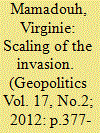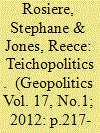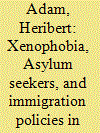|
|
|
Sort Order |
|
|
|
Items / Page
|
|
|
|
|
|
|
| Srl | Item |
| 1 |
ID:
110789


|
|
|
|
|
| Publication |
2012.
|
| Summary/Abstract |
A new political development that emerged after the disintegration of the Soviet Union was the adoption of 'homeland stances' by the newly independent states. Through the construction of the homeland image, the states of the region claimed responsibility not only for their own citizens, but also for a diaspora community of co-ethnics. Kazakhstan became one of these states and its leadership portrayed Kazakhstan as the homeland of the Kazakh diaspora. Furthermore, Kazakhstan's leadership developed far more active homeland rhetoric and initiated an ethnic return-migration policy as early as 1992. This paper will explore the discourse of Kazakhstan's leadership on the repatriation of its co-ethnics as well as the legal and political context that it created to achieve their smooth absorption into domestic society.
|
|
|
|
|
|
|
|
|
|
|
|
|
|
|
|
| 2 |
ID:
129096


|
|
|
|
|
| Publication |
2014.
|
| Summary/Abstract |
The categorization of displaced people is grounded in criteria enshrined by international and regional conventions as well as receiving states' asylum and immigration policies. However, drawing distinctions between displaced people remains a controversial issue because the causes of displacement are more diverse than the categories assigned. Whilst various categories confer different rights and entitlement, the forcibly displaced are often obliged to aspire to particular identities driven by their resettlement livelihood objectives. This paper is based on a study carried out in Brazzaville, Republic of Congo and Newcastle upon Tyne, United Kingdom. The paper argues that the institutional and policy environments in the locations where resettlement is sought determine the way displaced people identify themselves in displacement and how they appraise their circumstances and their consequent adaptive livelihood reconstruction strategies. Furthermore, it is shown here that formalized displacement categorization adds complexity to the way displaced people must deal with their circumstances and negatively impacts on livelihood adaptation. Whilst categorization may serve perceived institutional needs, this study finds that displaced people's self-identification makes them resilient and enables survivability.
|
|
|
|
|
|
|
|
|
|
|
|
|
|
|
|
| 3 |
ID:
105892


|
|
|
|
|
| Publication |
2011.
|
| Summary/Abstract |
This article seeks to explain how and why groups and networks of undocumented migrants mobilizing in Berlin, Montréal, and Paris since the beginning of the 2000s construct different types of claims. The authors explore the relationship between undocumented migrants and state authorities at the local level through the concept of the citizenship regime and its specific application to undocumented migrants (which they describe as the "borderline citizenship regime"). Despite their common formal exclusion from citizenship, nonstatus migrants experience different degrees and forms of exclusion in their daily lives, in terms of access to certain rights and services, recognition, and belonging within the state (whether through formally or nonformally recognized means). As a result, they have an opportunity to create different, specific forms of leeway in the society in which they live. The concurrence of these different degrees of exclusion and different forms of leeway defines specific conditions of mobilization. The authors demonstrate how the content of their claims is influenced by these conditions of mobilization.
|
|
|
|
|
|
|
|
|
|
|
|
|
|
|
|
| 4 |
ID:
181271


|
|
|
|
|
| Summary/Abstract |
The 2018 Central American migrant crisis, in which thousands of people traveled through Mexico in caravans toward the United States border, was a milestone in Mexican immigration policies. The humanitarian crisis evidenced the poverty and vulnerability to which migrants are exposed in their places of origin. At the same time, immigration policies in Mexico became more restrictive due to both internal and external political pressure and, as a result, the securitization measures have become more pervasive than all other migration control policies. This article suggests that this new approach to migration could be ineffective over the long-term, whilst becoming increasingly dangerous for migrants.
|
|
|
|
|
|
|
|
|
|
|
|
|
|
|
|
| 5 |
ID:
123086


|
|
|
|
|
| Publication |
2013.
|
| Summary/Abstract |
KATE NICHOLLS looks at policy responses to labor market challenges in Ireland, Portugal, and Greece between 1990 and 2008, focusing in particular on work-life balance, higher education, and immigration policies. She argues that there is greater divergence among the recent developmental paths taken by these three "bailout" countries than is often assumed.
|
|
|
|
|
|
|
|
|
|
|
|
|
|
|
|
| 6 |
ID:
113522


|
|
|
|
|
| Publication |
2012.
|
| Summary/Abstract |
This paper analyses narratives about immigration and immigration policies as geopolitical discourses. It focuses on the diverse geopolitical imaginations and representations of the immigrant "invasion" in Western Europe. It builds upon insights from critical geopolitics, especially Ó Tuathail's grammar of geopolitics (2002), and adapts this framework for analysing geopolitical reasoning about specific flows of people. It distinguishes three main storylines of the "invasion" at three scales: Invaded Neighbourhood, Nation at Risk, Western Europe under Siege. Although each shares the "invasion" storyline, these complementary and at times competing discourses of fear target different groups of immigrants and call for different type of policies.
|
|
|
|
|
|
|
|
|
|
|
|
|
|
|
|
| 7 |
ID:
111647


|
|
|
|
|
| Publication |
2012.
|
| Summary/Abstract |
This article considers the trend in many countries towards securitised immigration policies and "hardening" of borders through the construction of walls or fences. In contrast the borderless world of globalisation, it identifies these attempts to strengthen control of borders as teichopolitics: the politics of building barriers. This article analyses the different types of hardened borders that exist today and proposes a typology of frontlines, fences/walls, and closed straights. Then the article maps the locations of these barriers and argues that although other justifications ranging from smuggling to terrorism are often put forward, these barriers are mostly connected with managing immigration flows. Indeed, many of these barriers are located on important economic or social discontinuity lines, precisely where the system reveals its underlying logics. These walls and fences symbolise the emergence of a privileged few who actually live the promise of globalisation and defend its privileges through teichopolitics.
|
|
|
|
|
|
|
|
|
|
|
|
|
|
|
|
| 8 |
ID:
142486


|
|
|
|
|
| Summary/Abstract |
In the context of Germany's anti-Semitic past, current attitudes towards refugees and immigrants are surveyed and compared with other countries. Higher levels of xenophobia in former East Germany, despite far fewer foreigners than in West Germany, is explained with the official denial of the fascist legacy, in contrast to an effective reeducation policy and dealing with the Nazi past in the West. Islamophobia and allegations of welfare tourism have now emerged as the main obsession of xenophobes. Yet, overall attitudes towards outsiders have improved, together with legislative changes in immigration policy and citizenship acquisition, the weekly anti-Muslim demonstrations by PEGIDA (Patriotic Europeans) in Dresden and arson attacks on asylum homes notwithstanding. Younger and better educated Germans are far less xenophobic. This analysis portrays the current German public discourse, provides relevant statistics on immigration, explores contested integration/asylum policies, scrutinizes implications of categories from the cultural repertoire through which migrancy is understood and assesses the contending political forces.
|
|
|
|
|
|
|
|
|
|
|
|
|
|
|
|
|
|
|
|
|